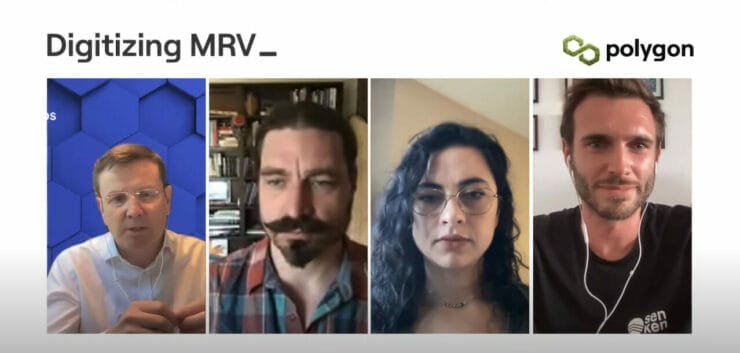At Polygon’s inaugural Green Blockchain Summit, Chainlink Labs’ Head of Carbon & ESG Solutions, Charlie Moore, moderated a panel called “Digitizing MRV: Ensuring Quality, Avoiding Fakery, and Creating Transparency.” Senken’s Adrian Wons, Nori’s Alexsandra Guerra, and Regen Network’s Gregory Landua discussed how web3 systems for measurement, reporting, and verification of on-chain environmental credits can surpass the speed and scope of legacy registry systems.
These new multi-chain systems would transcend the need to trust in institutions by making environmental data widely and publicly available. Real-time on-chain MRV would spur the evolution of new carbon credit products and new markets structured around those innovations.
“The better we have transparency around who is saying what about where using what data and what methodology, the better we can create new units of account and then the better we can bundle those units of account on this spectrum of non-fungibility to fungibility and financialization versus utility,” said Landua.
Guerra highlighted the potential for on-chain systems to better classify and track different types of carbon credits related to avoidance, reduction, and removal of emissions in a portfolio approach that allows buyers to be more intentional about the kind of impact they’re paying for.
Ultimately, this would pave the way for an open registry system with more dynamic, DAO-based governance, instead of the current institutional registry system which dates back to the 1990s.
“I would classify these registries as web1 – they do things very slowly,” Guerra said. “They do not innovate quickly. And the climate issue is such that it’s moving very quickly.”
The panelists were generally optimistic about web3’s potential to enact meaningful change quickly enough.
“All it takes is a couple of big buyers to do the research and recognize the integrity that comes with transparency and make the choice,” Landua said.
“Markets change really quickly and I think we see a lot of these corporations driven by pressure from their consumers,” Guerra agreed. “What’s the main consumer group that’s growing now? Gen Z and millennials, and they’re thinking about things in a whole new way. I think that will start changing the tides really quickly.”
Watch the entire panel discussion.


